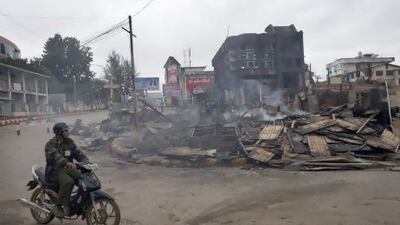LASHIO, MYANMAR // Hundreds of Muslim families sheltered in a heavily guarded Buddhist monastery yesterday after two days of violence in the northern Myanmar city of Lashio that left Muslim-owned properties in ruins and heightened fears over an escalating religious conflict.
About 1,200 Muslims were taken to Mansu Monastery after Buddhist mobs terrorised the city on Wednesday, a move that could signal the resolve of a government criticised for its slow response to previous religious attacks.
The unrest in Lashio shows how far anti-Muslim violence has spread in the Buddhist-dominated country as it emerges from decades of hardline military rule.
One man was killed and five people were wounded during Wednesday's clashes, said Ye Htut, a presidential spokesman.
A senior police officer said the man who died was a Muslim, and those injured were all Buddhists, including a journalist who was attacked by a Buddhist mob.
He said 300 soldiers and 200 police were enforcing security in Lashio, a city of 130,000 people near Myanmar's northeastern border with China.
The authorities moved quickly to stem the violence by deploying troops, banning all unlawful assembly under a state of emergency, and setting up roadblocks to prevent troublemakers entering the city.
Ye Htut said 25 people were under investigation in connection with the violence.
When religious unrest erupted in the central city of Meikhtila in March, there were three days of fighting before the authorities took decisive action. At least 44 people died there.
Khaing Aung, the director general of the religious affairs ministry, said the government had learned from past experiences.
"Since we are taking action, people understand there should be no more violence," he said.
Thein Maing, who sheltered at the monastery with his wife and six children, said they had only dared to leave their home when they saw soldiers patrolling the streets on Wednesday.
"I approached the soldiers and said, 'We are afraid and we don't know where to go. Please help us', and they sent us here."
Khin Kyi said her family hid in the house of an ethnic Chinese neighbour, while Buddhist men with sticks and swords prowled the area.
"We were very scared. This has never happened before," she said, sitting amid bags of clothes in the crowded prayer hall overlooked by statues of Buddha
Badanta Ponnya Nanda, the head monk at the monastery, said he hoped the city would be secure enough for Muslims to return to their homes within a week.
"Today we need to calm everything down," he added.
He also told how he had tried to reason with the crowd, telling them to respect the law.
"After that they went and burned the mosque," he said.
Shops reopened yesterday as police and soldiers patrolled the streets. There was no sign of the Buddhist youths who had marauded through town, burning Muslims out of their homes the day before.
Kyaw Kyaw Han, a soldier, stood guard outside a ransacked mosque littered with broken glass and religious books.
"We are here to guard against people starting fires," he said.
Ye Htut said three religious buildings had been destroyed, including a large mosque in the city centre, along with 32 shops and a cinema. Ruins smouldered on Thursday and the area was cordoned off.
There did not appear to be any Muslims nearby.
The violence was sparked by reports on Tuesday that a Muslim man had badly burnt a Buddhist woman. The state-run MRTV television station said Ne Win, 48, had poured petrol over Aye Aye Win, 24, who sold fuel by the side of the road, and set her on fire. After police detained Ne Win, Buddhists surrounded the police station and demanded he be handed over.
Muslims make up about 5 per cent of the estimated 60 million people in Myanmar. The unleashing of ethnic and religious hatred after 49 years of military rule ended in March 2011 raises questions over whether the reformist president, Thein Sein, has full control of security forces as the country goes through its most dramatic changes since a coup in 1962.
The most serious unrest has taken place in Rakhine State. It began in June last year, and in October there were attacks by Rakhine Buddhists on Rohingya Muslim communities that the New York-based group Human Rights Watch said amounted to ethnic cleansing.
The government describes the stateless Rohingya as illegal "Bengali" immigrants from neighbouring Bangladesh.

